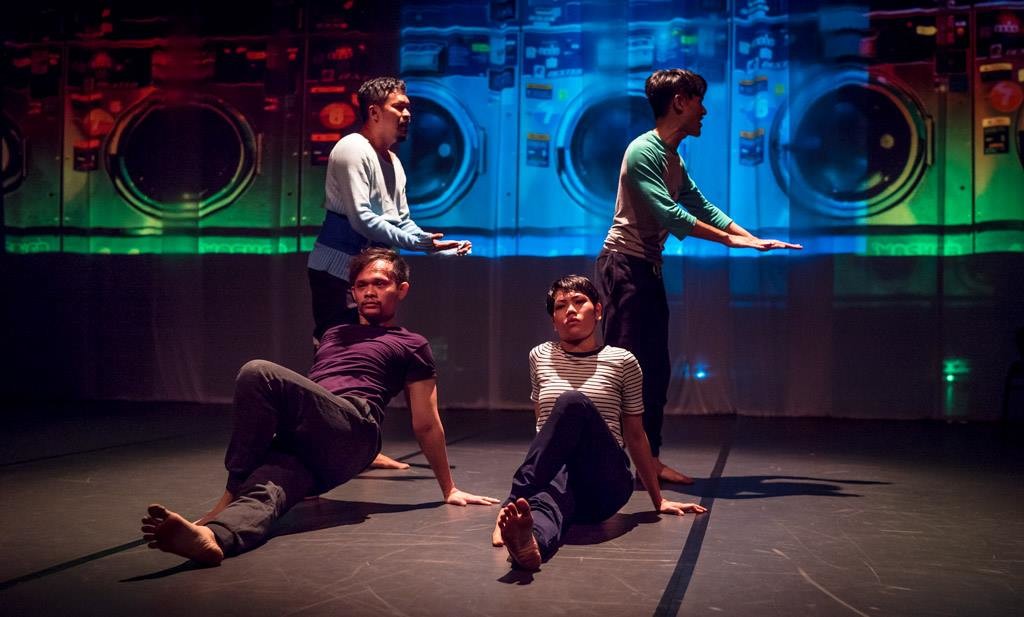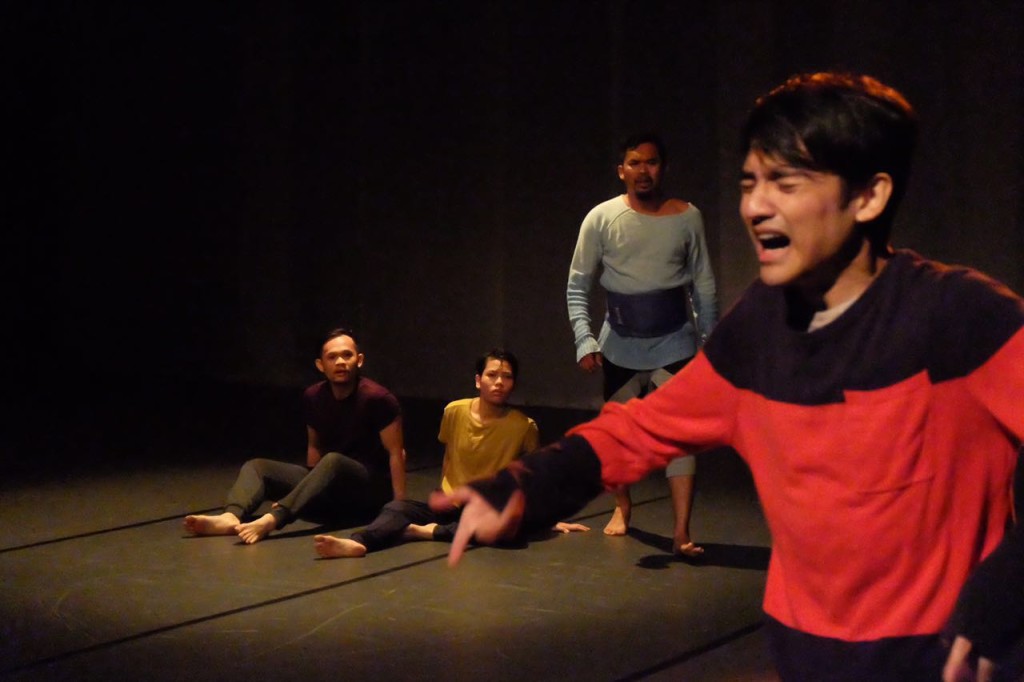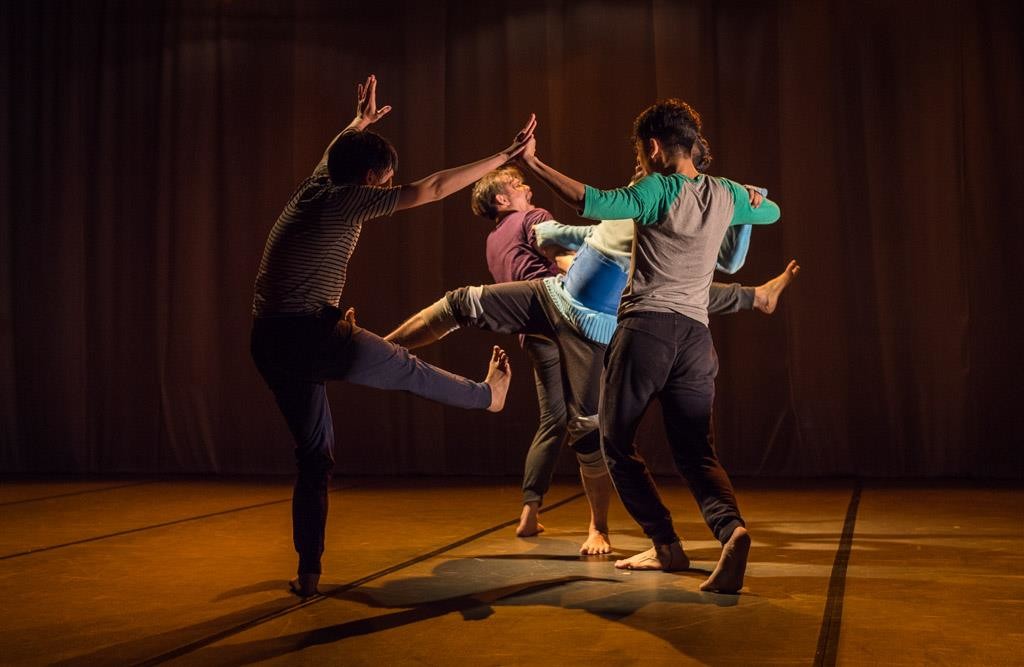- Views4028
- Likes1
Langkau
25-27 March 2016
Black Box ASWARA
Review by Bilqis Hijjas
Langkau, last weekend in the Black Box at ASWARA, is a gangly adolescent of a show. Loosely jointed, sometimes to the point of awkwardness, and fixated with its own development, it is also possessed of a childlike sweetness of heart, a burgeoning thoughtfulness, and all the freshness and energy of youth. As the hybrid offspring of dance and theatre, its creator-performers (Murni Omar and Faillul Adam from ASWARA’s Faculty of Dance, and Iefiz Alaudin and Shahrul Mizad from the Faculty of Theatre) speak and move in equal measure. Other collaborators include Fasyali Fadzly, as third eye and scriptwriter.
Like every teenager, Langkau is socially awkward. Or rather, the work is about social awkwardness. And yet the performers themselves seem surprisingly at ease in their adopted disciplines. Faillul and Murni are fluent, clear and unpretentious in their use of text. Shahrul and Iefiz, who warn, “Kita ni bukan penari, tau!“, join the dancers in synchronous movement so deceptively casual it looks like anyone could do it: staggering in a circle with dangling arms, flapping both hands up around the face, or tossing the head back loftily to the rhythm of one toe tapping at the floor.
Episodes of dance and eclectic wildness alternate fluidly with more structured scenes set at a laundromat, where the effervescent Iefiz portrays a stuttering young man who takes social awkwardness to the edge of mental illness. His bumbling attempts to cosy up to Shahrul – playing an ostensibly well-adjusted older man – are touchingly human. In an ingenious burst of fun, Murni and Faillul play chatty washing machines, taking it upon themselves to critique the humans’ progress.
The actors also critique their own progress, with winning self-reflexivity. In the midst of a big group dance, Faillul calls time out. The dance grinds to a halt, the performers mop their brows, and start to squabble. The project of Langkau arose from the desires of the artists (four of whom have recently returned with Masters degrees from the West) to put new ideas into practice, and to test themselves beyond their usual limits. Hopes are high for these shining youth, but the artists turn the tables on any detractors by exposing the stress of living up to expectations through Langkau‘s dramatic action.
They bicker good-naturedly about their creative options. Some support a less intellectual, more pragmatic, approach: “Cantum-cantumlah… buat je… the big number, improvisation — the end!” Others bewail how their egalitarian aspirations have got them into a mess: “Kita demokrasi sangat!”
When Faillul’s fretting threatens the collaboration, Murni commands him to calm down: “Sedia, ya! Tarik nafas…” She leads him into a sequence of tranquil tai chi. Then suddenly we’re back in the laundromat, and their movements shift into the actions of a washing machine. One hand reaching back over the shoulder is perhaps the water coming on, both arms swishing around the waist are the wash cycle. It’s one of many admirably slick transitions in Langkau. In another scene, a diatribe against the audience looking at their mobile phones mutates into a meltdown about self-consciousness, leaving Iefiz shrieking hysterically, “Jangan tengok aku! Jangan tengok aku!”
Impossible not to look, especially when the actors are so close. Langkau transforms the cramped Black Box space by dividing the audience into three asymmetrical sections, with different angles of perspective. This does not solve sightline issues completely, but it creates a more intimate engagement and immediately sets the audience’s expectations for something unorthodox.
Text and movement are given the same playful treatment. Self-help epigrams — “Sebelum kau mencaci maki, baik kau sedar diri!” — are sung out as blithely as nursery rhymes. Murni and Iefiz act out the proverb “Hidung tak mancung, pipi tersorong-sorong” with their hands pecking at their own faces like accusatory crows. The physical humour steers refreshingly clear of slapstick, opting for wacky appeal. In one instance, a discount offer for washing machines is illustrated with movements from tari piring. Elsewhere, a dance is triggered by the gedegang-gedegung sound of a Mat Rempit’s dirty boots in the wash.
The laundromat scenes of more dramatic text, played quite straight, help the audience to orient itself. Iefiz’s character’s monologue about why he has no friends disintegrates into pitiful repetition: “Mak jenis kerja. Ayah sakit. Mak jenis kerja. Ayah sakit…” Shahrul’s speech about being publicly humiliated by a younger superior, in his job as a low-status worker at a museum, strikes the right note of baffled helplessness, although it sometimes tips the scales into melodrama.
The occasional technical issue, and a general lack of tightness, don’t derail Langkau‘s freewheeling rollercoaster. Projected video, by Shah Hassannul Manzar, is also somewhat haphazard, with the exception of the confronting bank of washing machines during the laundromat scenes, which look like judgmental eyes trained on the protagonists. However, the music, largely by Faizal Fauzi, supports the action unobtrusively yet effortlessly, especially the final dance scene in which the characters’ voices are overlaid on the score, but played backwards. Listening to it is like being an autistic person trying to decode someone’s emotions from their facial expressions — you know it makes some kind of sense, but what? It’s a delightful final riff on the social phobia theme, wittily spinning any audience apprehensions about this bold young production back at ourselves.
All photos courtesy of Langkau production team.



